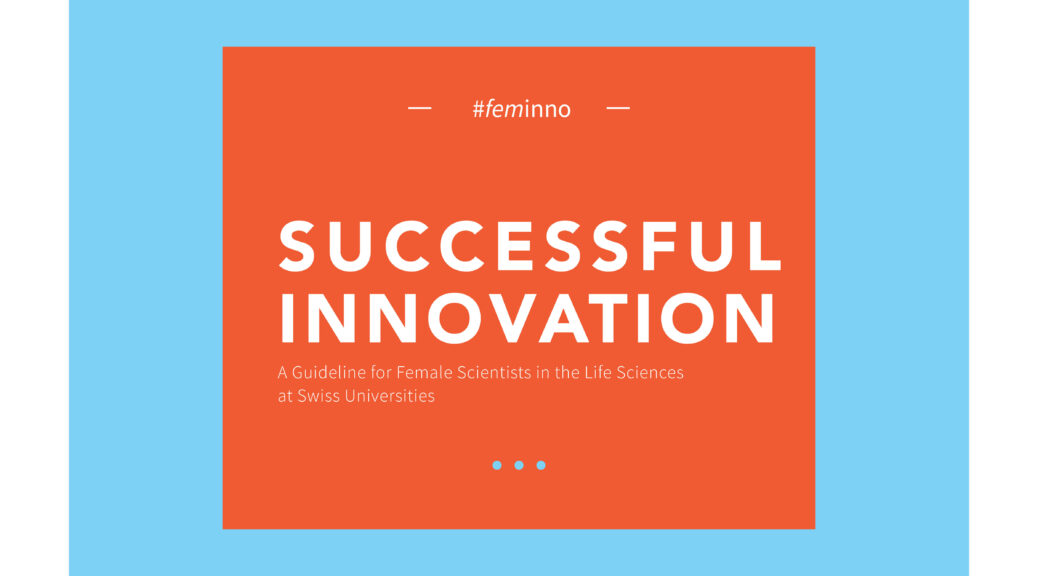Successful Innovation. A Guideline for Female Scientists in the Life Sciences at Swiss Universities. Ute Budliger and Melanie Paschke (eds.). With contributions by: Ute Budliger, Manuela Dahinden, Carl Emerson, Roger Gfroerer, Daniela Gunz, Christiane Löwe, Tanja Neve-Seyfarth, Melanie Paschke, Isabelle Siegrist, Carolin Strobl. Zurich-Basel Plant Science Center, 2020. https://doi.org/10.3929/ethz-b-000443822
This guideline is for women in life sciences who are looking for encouragement and want to make use of their drive and know-how and competences to assess the potential of their own ideas. We strongly believe that the conditions for female scientists to become entrepreneurs have never been better.
Nothing should hold women back from the conviction that their ideas have value and that they MUST consequently enter the marketplace for e.g. Switzerland to remain competitive, and for society to grow in gender equality. Women-owned Small Medium Enterprises (SMEs) are reported to be growing at a faster rate than the economy as a whole in several OECD countries; however, the removal of anumber of obstacles would allow their potential to be fully tapped.
These guidelines were developed as a helpful tool for female scientists, entrepreneurs, educators, coaches and all those involved in gender equality.
Part 1 is for female scientists with a great idea on mind:
- In Towards increasing female impact on innovation, Ute Budliger reflects on the role of women in entrepreneurship and its current practice.
- In Career engagement and preparedness, Daniela Gunz and Roger Gfroerer guideline to proactively design important career transitions.
- In Why negotiation is your key in starting innovation from the academic lab, Carl Emerson shows that having strong negotiation skills allows you to establish what is your current baseline from which you position your new development. He introduces the best negotiation process according to the Harvard Negotiation Project and gives a Negotiation Preparation Checklist.
- In Best practice recommendations for a good life balance, Tanja Neve-Seyfarth et al. gives good practices for a woman’s career as well as for her private life that may contribute to a good life balance. The authors give an overview on institutional support at Universities of Zurich and Basel as well as ETH Zurich for example on organizing the maternity leave, visibility at event, academic age in grant applications but also personal measurements as for example organizing the work load, avoiding gate keeping, and the negotiation of family work with partner and employers.
- In How to apply the Business Canvas to your innovation project, Isabelle Siegrist discusses the innovation steps from business idea generation to market validation from a gender sensitive viewpoint.
- In Where do you get support for your project, Melanie Paschke and Manuela Dahinden provide information on how to access innovation support services, funding, awards, female innovation programs and networks.
Part 2 is for educators, coaches and all those involved in gender equality:
- In Insights into feminno, Ute Budliger and Melanie Paschke present the outline and curriculum of the feminno program as an example for an impactful, women-only, innovation program at Swiss universities.
- In Towards an innovation-friendly culture for female scientists: Results from a Delphi survey, Melanie Paschke et al. explored the views of feminno participants, as well as experts in the fields of innovation management, gender equality, entrepreneurship, research or from other areas about the facilitators, barriers, requirements, resources and incentives that influence that female scientists can become successful innovators. What can institutionalized innovation and mentoring programs do to support female scientists, to establish networks and elevate confidence? How could a innovation-friendly entrepreneurial academic culture be supported by institutionalized programs?

